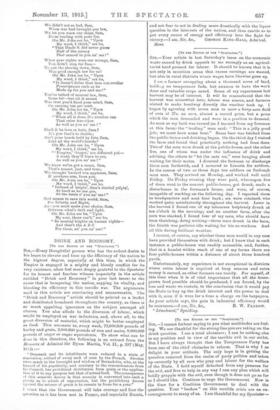[TO THII EDITOR OF THE "SPECTATOR. "' Sin,—Your article in last
Saturday's issue on the economic waste caused by drink appeals to ma strongly as an agricul- turist hard pressed for labour. It should be known that it is not only in munition areas that excess earnings are wasted, but also in rural districts where wages have likewise gone up.
I am a farmer occupying about a thousand acres of land, holding no temperance fads, but anxioua to have the work done and valuable crops saved. Some of my experiences last harvest may be of interest. It will be remembered that the harvest was somewhat late; labour was scarce, and farmers wished to make headway directly the weather took up. I began by agreeing with seven men to mow a forty-acre field of oats at 27s. an acre, almost a record price, but a price which the men demanded and were in a position to demand. As soon as my back was turned (so I learned from my foreman at this farm) the "leading" man said: "This is a jolly good job; we must have some beer." Some beer was fetched from the public-house and drinking began. On the third day I visited the farm and found that practically nothing had been done. Two of the men were drunk at the public-house, and the other five, one of whom was under the influence of drink and advising the others to "let the oats rot," were hanging about waiting for their mates. I directed the foreman to discharge three men forthwith, and I motored to Lincoln for soldiers. In the course of two or three days ten soldiers on furlough were sent. They arrived on Monday, and worked well until Friday. On Friday evening they were paid, whereupon five of them went to the nearest public-house, got drunk, made a disturbance in the foreman's house, and were, of course, incapable of working on the following day. I reported them to headquarters and sent four back ; six were retained. who worked quite satisfactorily throughout the harvest. Later in the harvest I found one of my labourers helplessly drunk at ten o'clock in the morning; and on another farm, after the corn was stacked, I found four of my men, who should have been thatching. doing nothing—three were drunk in the barn, the fourth was perforce idle waiting for his co-workers. And all this during brilliant weather.
I cannot, of course, say whether these men would in any case have provided themselves with drink; but I know that in each instance a public-house was readily accessible, and, further, that in a hamlet within reach of one of my farms there are four public-houses within a distance of about three hundred yards.
Unfortunately, my experience is not exceptional in districts where extra labour is required at busy seasons and extra money is earned, as other farmers can testify. For myself, at this time when it is of vital importance that all the home- grown food possible should be produced, I am forced, by the loss and waste we sustain, to the conclusion that it would pay the State to buy up the drink interest and the power to deal with it, even if it were for a time a charge on the taxpayers. As your article says, the gain in industrial efficiency would






































 Previous page
Previous page